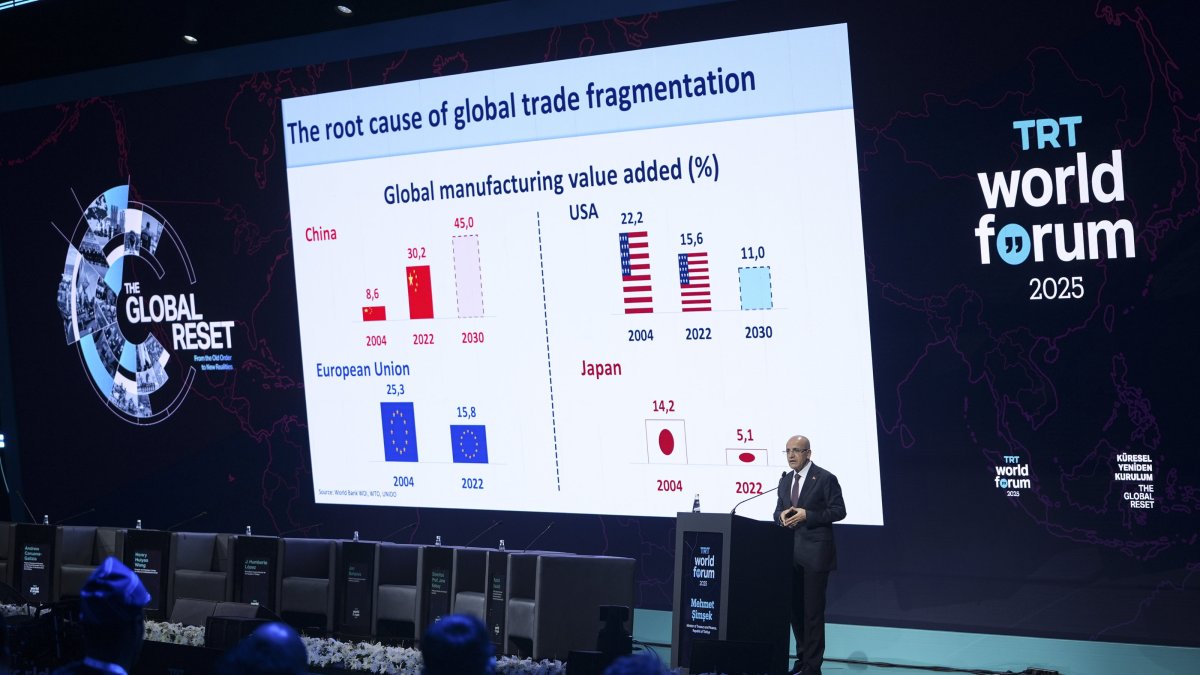Türkiye aims to be back as a major regional hub for foreign direct investment (FDI) as it is regaining momentum, Treasury and Finance Minister Mehmet Şimşek said on Saturday.
Evaluating the global and domestic economic outlook, the minister reiterated the main goal of price stability and lowering inflation to single digits.
“We kinda like for (the) past decades slowed, now we are regaining momentum. We want to be back as a major regional hub for foreign direct investment,” Şimşek said in his address at TRT World Forum.
Citing Türkiye’s population and large market, he noted that FDIs have increased almost twentyfold over the past 20-25 years, adding that they hope to achieve investment-grade status over the next few years.
“We think there is significant upside … We’ve seen two-three notches of upgrades over the past couple of years,” he said, referring to recent upgrades. All major rating agencies upgraded Türkiye’s credit rating following a shift to more conventional economic policies back in 2023.
He also pointed to strong growth performance in Türkiye since 2002, and in general among emerging markets, which stood at 5.4% between 2003 and 2024.
When excluding China and India, which he said are very large countries, Türkiye’s growth performance becomes “quite visible,” the minister said.
Earlier in his presentation, touching upon Türkiye’s “macroeconomic stabilization and reform program,” Şimşek said there was “huge progress” across the board, underlining that the structural transformation is key to making all these sustainable.
Suggesting that they are currently in the second phase of the program, he added: “Progress is significant, inflation is falling, we would like to get back to inflation with single digits soon.”
Annual inflation in Türkiye ticked up slightly to 33.29% in September from 32.95% in August. This, however, marked a steep fall compared to around 75.5% in May last year. October data is due to be announced on Monday.
At the same time, Şimşek also referred to improvements in the value chain, suggesting that the share of medium and high-tech exports in total exports is rising.
Starting his presentation, he touched upon global challenges, at the top of which comes protectionism.
Protectionism ‘here to stay’
“Protectionism is a new normal,” he said, adding that it was “here to stay.”
Citing the rise of China and shifts in global manufacturing, trade fragmentation, the minister still suggested that Türkiye was less vulnerable to the latter owing to its trade agreements.
“We seem to be relatively less vulnerable. Why? Because 62% of our exports go to the countries that we have free trade agreements (FTAs) (with),” said Şimşek.
“More than 80% of Turkish exports go to our immediate neighborhood,” he added, citing regions such as Central Asia and the Middle East, which he said makes the country less vulnerable.
Another notable factor, according to Şimşek, is services exports. “Exports of services to gross domestic product (GDP), by international standards, is more significant,” he said.
“And protectionism has not yet infected services trade, not yet,” he added.
Lastly, he also underscored the significance of regional integration, suggesting Türkiye sees it as an “antidote” to global fragmentation.

The Daily Sabah Newsletter
Keep up to date with what’s happening in Turkey,
it’s region and the world.
SIGN ME UP
You can unsubscribe at any time. By signing up you are agreeing to our Terms of Use and Privacy Policy.
This site is protected by reCAPTCHA and the Google Privacy Policy and Terms of Service apply.

